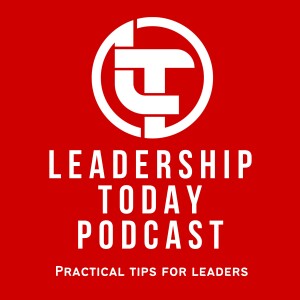
Leadership Today - Practical Tips For Leaders
Business:Management
We explore the impact of good people doing bad things upon our assessment of others.
Transcript
Welcome to episode 150 of the Leadership Today podcast where each week we bring research to life in your leadership. That’s right - episode 150. Thanks to everyone for your support on the podcast over the past four years - it is much appreciated. This week we look at the impact of good people doing bad things upon our assessment of others.
Have you ever been let down by someone? Perhaps you thought they were a “good” person, but found out they did something surprisingly bad. What impact did that have on your perception of the person?
Research demonstrates that when we evaluate someone as “good” but they then do something unexpectedly “bad”, it understandably shakes our faith in the person. However, it also makes us question our ability to judge character generally. If we were wrong about them, maybe we’re wrong about everyone else?
There are plenty of famous examples of seemingly good people doing bad things than we could cover here, whether it’s in government, the entertainment industry or in corporations. The research suggest that the immoral act of a “good” person makes the world feel more confusing. In fact, the researchers found that the larger the difference between our initial impression of the individual and their bad act, the greater the impact on our ability to make sense out of the world.
So what do we do about this?
-
We need to have realistic standards of others. No one is perfect and we are all going to let people down from time to time.
-
We need to recognise that one person’s bad behaviour doesn’t make everyone else slightly worse. We shouldn’t let it shake our faith in humanity.
-
When people do slip up, it’s helpful to demonstrate empathy. Listen to the person and understand their experience. We don’t need to endorse or agree with what they’ve done, but we also don’t need to write people off over one act.
-
We need to set up work environments where people can speak up and be honest. Maybe someone was tempted to take financial advantage of a customer, or to cut corners on a project. As their leader, I’d rather have that open dialogue early so I can coach someone away from an even worse outcome.
If you found this episode helpful, I would love it if you could take a minute to provide a rating and review. This really helps others to find the podcast. Have a great week.
Reference
Guan KW, Heine SJ. When Good People Break Bad: Moral Impression Violations in Everyday Life. Social Psychological and Personality Science. February 2022. doi:10.1177/19485506221076685
More Episodes
Episode 50 - Seven Reasons to Get Back to Nature
 2019-08-23
2019-08-23
Episode 49 - Accurate Self-Assessment
 2019-08-16
2019-08-16
Episode 48 - Four Ways to Explore Your Untapped Potential
 2019-08-09
2019-08-09
Episode 47 - Five Ways Busy Leaders Prioritise Treating People Well
 2019-08-02
2019-08-02
Episode 46 - Saying 'No' Without Being a Jerk
 2019-07-26
2019-07-26
Episode 45 - Overcoming a Fear of Delegation
 2019-07-19
2019-07-19
Episode 44 - 10 Leadership Lessons From Year One of the Leadership Today Podcast
 2019-07-12
2019-07-12
Episode 43 - How Thinking in the Third Person Makes You a Wiser Leader
 2019-07-05
2019-07-05
Episode 42 - The Power of "I Don't Know"
 2019-06-28
2019-06-28
Episode 41 - Is Putting Employees First Actually Better For Customers?
 2019-06-21
2019-06-21
Episode 40 - Are Workaholics Bad for Business?
 2019-06-15
2019-06-15
Episode 39 - Four Ways Leaders Build Trust
 2019-06-08
2019-06-08
Episode 38 - Do People Really Shoot the Messenger?
 2019-06-01
2019-06-01
Episode 37 - Why Everyone is a Born Leader
 2019-05-25
2019-05-25
Episode 36 - Four Steps to Building a Legacy of Leaders
 2019-05-18
2019-05-18
Episode 35 - Managing Your Time in an Infinite Job
 2019-05-11
2019-05-11
Episode 34 - Moving from Stressed to Strong
 2019-05-04
2019-05-04
Best of the Podcast Replay - Prisoners and Performance Ratings
 2019-04-27
2019-04-27
Best of the Podcast Replay - Do Teams Still Form, Storm, Norm and Perform?
 2019-04-20
2019-04-20
Episode 33 - The Problem with Solving Problems
 2019-04-13
2019-04-13
Create your
podcast in
minutes
- Full-featured podcast site
- Unlimited storage and bandwidth
- Comprehensive podcast stats
- Distribute to Apple Podcasts, Spotify, and more
- Make money with your podcast
It is Free
You may also like

The Business Of


Bank of America Treasury Insights


Human Capital Leadership


The Power of Music Thinking


BusinessWISE


3 Takeaways


- Privacy Policy
- Cookie Policy
- Terms of Use
- Consent Preferences
- Copyright © 2015-2024 Podbean.com


 iOS
iOS Android
Android